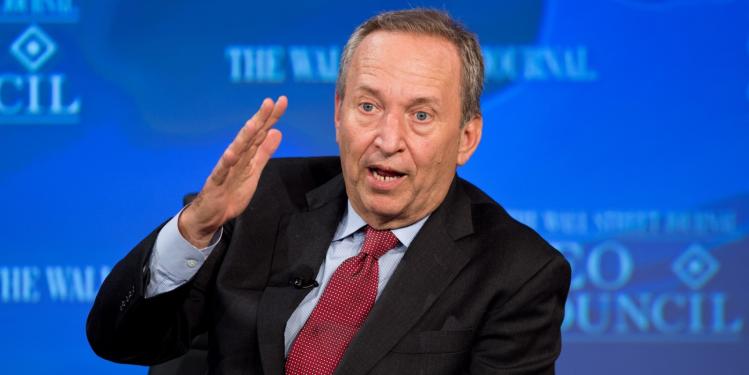
It’s good to see ex–Treasury Secretary Larry Summers back in the Democratic fold. After his tone-deaf gaffe about women scientists—speaking as the Harvard president no less—he has mostly been making tons of money giving speeches and shilling for hedge funds. His last public-policy accomplishment was to help block the regulation of financial derivatives in 1994, thus making himself a proximate cause of the 2008 banking collapse. But it takes a very smart person to cause the loss of tens of trillions of dollars.
Summers, along with Ed Ball, the British Labour Party’s shadow prime minister, has co-chaired a working group on “Inclusive Prosperity,” which recently issued a report that builds on an immense body of recent research showing that maldistribution of incomes correlates with lower growth—the luxury spending of the super-rich can’t compensate for the shrinking spending power of the middle -classes—and a greater tendency to economic volatility. Worse, highly skewed income distribution reduces social mobility. The locked-in advantages of the children of the top income decile of the United States may already be irreversible.
The United States actually has one of the more progressive systems of national taxation, but other countries allocate their tax revenues expressly to force more egalitarian outcomes—high-quality early childhood education, deep family supports like maternity leave, ready access to quality higher education and health care. In America, the out-of-pocket costs of health care and higher education are soaring. Obamacare has helped, but its financial benefits are tilted more to the poor than to the middle class.
One of the working group’s striking recommendations is to add short-term income relief for the middle class, modeled after the Earned Income Tax Credit (EITC) for the working poor. Whereas the family EITC benefit phases out at just above $23,000 in income, the working group suggests that its recommended income relief pick up there and phase out at perhaps $85,000. The plan is presented as a recovery program, with a three-year sunset date. But it’s a terrific idea, and might be welcomed by employers. If it’s ever enacted, it would be very hard to phase out.
The cost of income supplements would be eased with strong action on the minimum wage. McDonald’s workers in Denmark already get middle-class pay—on average more than $20 an hour, plus sick leave and benefits. The cost of a Big Mac in Denmark is only 35 cents more than in the United States, and McDonald’s has shown no sign of disembarking from Denmark, even though their local profits are probably lower than here.
A new and very important problem, which the working group properly deplores, is the sudden rise of a new “gig economy.” There is a new upstart royalty of tech firms, like Uber and Airbnb, that have already created dozens of paper billionaires by building global personal service companies, with millions of contracted employee/-vendors. Uber offers taxi service in a large number of cities throughout the world. Ostensibly, the only legal relationship between Uber and a driver is a license to make use of the Uber software and accounting service. Uber shares requests for a pickup, and drivers compete for the opportunity. The riders pay Uber, which takes its cut before paying the driver. Uber expects to rake in $10 billion in revenues this year while contractually disclaiming any obligations to its workers or customers—the endpoint of a long trend toward the utter commodification of workers. (The legality of Uber’s self-insulation is being tested in a number of courts.)
For me, the major disappointment with the report is its treatment of trade—offering a ringing endorsement of free trade, while deploring “currency manipulation,” especially by the Chinese. Currency manipulation is the least of China’s offenses, for it grossly violates every principle of free trade. It is engaged in the greatest campaign of industrial espionage in history. It dumps basic manufactures at costs far below the cost of production. Nucor, probably the world’s most efficient steelmaker, says that China is now selling steel at less than the cost of shipping. The Chinese raise an infinity of non-tariff trade barriers—special licenses, requests to turn over source code of software imports “to ensure...safety,” and mandates licenses of crown-jewel technology to Chinese partners. Disgracefully, big American companies, like Boeing, GE, and Caterpillar, lusting after Chinese markets, often comply. If history is any guide, they will soon find themselves losing business to Chinese firms deploying their technology. The international trade organizations are rarely helpful, and the time has long since passed for imposing sharp penalty tariffs against Chinese products until they follow the rules.
That said, overall the report is a cogent, research-based, and practical platform program for a Democratic presidential campaign. The slogan “Inclusive Prosperity” might make a great campaign banner. Readers can download the complete report from the website of the Center for American Progress. The research references alone are worth the price of admission.

